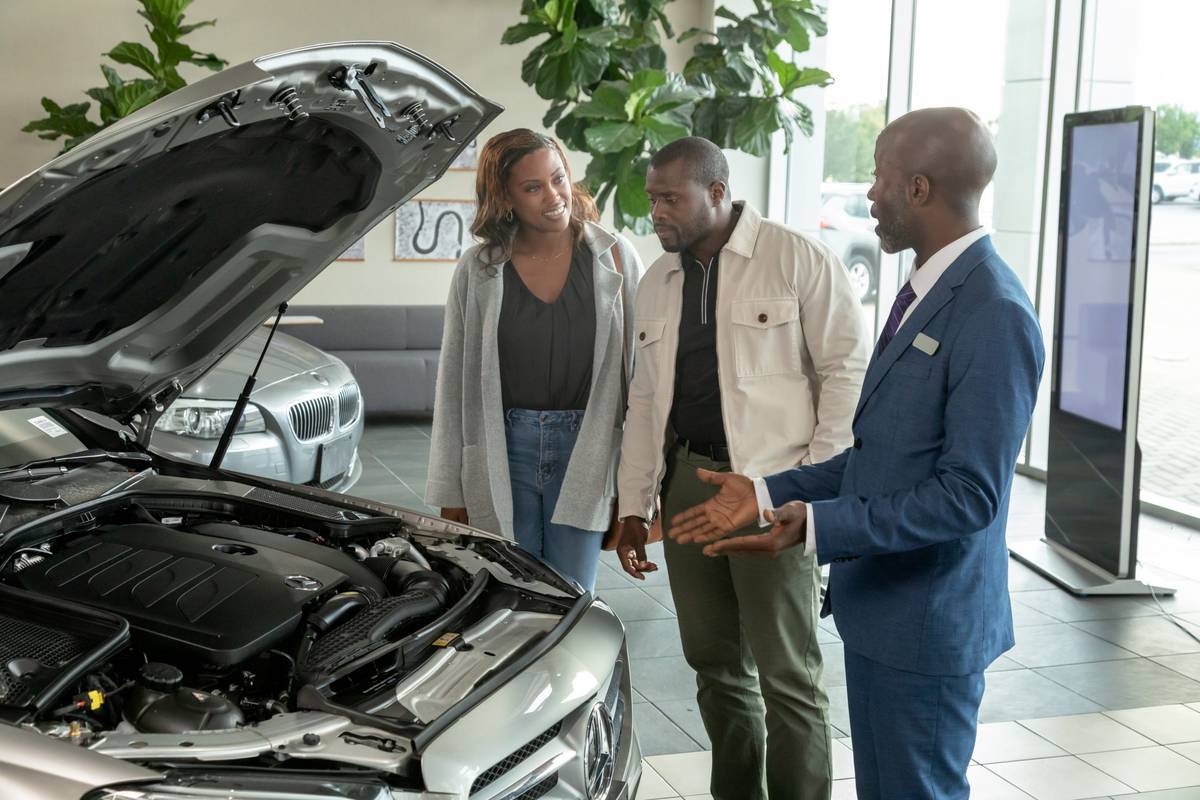Comprehending Exactly How Cars And Truck Dealerships Run: A Guide to Their Providers and Conveniences
Recognizing vehicle dealerships is vital for anyone thinking about a lorry acquisition. These facilities use more than simply autos; they give funding choices, trade-in chances, and after-sales solutions. Each aspect contributes in the general acquiring experience. Nevertheless, numerous customers continue to be not aware of just how these procedures work. This understanding can significantly impact their decisions and complete satisfaction (car dealer marketing). What are the essential aspects that consumers should grasp to browse this landscape effectively?
Overview of Car Car Dealership Workflow
Car car dealerships serve as critical hubs in the automotive sector, assisting in the sale and solution of cars to consumers. They run by preserving a diverse supply of suvs, trucks, and cars, which are sourced from manufacturers or via trade-ins. Sales teams are educated to help clients in making educated decisions, directing them with the purchasing procedure from choice to financing.
Along with sales, dealers usually supply repair and maintenance solutions, using skilled technicians to resolve vehicle concerns. This duality boosts customer loyalty, as owners return for both purchases and servicing requirements. Moreover, dealers typically provide warranties and financing alternatives, making it less complicated for consumers to acquire vehicles.
Effective marketing approaches, consisting of promotions and neighborhood interaction, assistance dealers attract possible buyers. Eventually, their complex operations add greatly to the total success and sustainability of the vehicle market.
Sorts of Dealerships: New vs. Made use of
Dealers can be classified mostly into 2 kinds: new and made use of. New auto dealerships commonly provide the most recent designs from numerous producers, supplying customers with the most current innovation, safety functions, and service warranty alternatives. These dealers often highlight incentives and promos to bring in buyers, making it appealing for those seeking a new vehicle.
In comparison, utilized car dealerships concentrate on previously owned cars, which can range from older models to almost brand-new automobiles. These car dealerships might offer a larger range of brand names and rate points, satisfying a wider audience with various spending plans. While used cars and trucks might not come with the most recent features, they commonly provide significant financial savings contrasted to brand-new models.
Ultimately, the choice in between brand-new and previously owned dealerships depends on individual preferences, budget restrictions, and the specific requirements of the purchaser, making each sort of dealer beneficial in its very own right.

Funding Options Available at Dealerships
When exploring funding choices at car dealerships, potential customers encounter various financing types developed to match different monetary situations. car dealer marketing. Furthermore, the choice in between leasing and getting a car can substantially affect total expenses and possession experience. Understanding these alternatives is necessary for making notified options in the car-buying procedure
Funding Kinds Discussed
Countless financing choices are readily available at dealers, accommodating a variety of client demands and choices. One common choice is the typical car loan, which typically entails a fixed rate of interest and month-to-month repayments over a specified term. An additional choice is the subprime lending, made for buyers with reduced credit history, often including higher rates of interest. Some dealers additionally supply promotional funding, such as 0% APR for a minimal time, targeting competent purchasers to encourage sales. In addition, clients may discover secured lendings, which utilize the automobile as collateral, possibly causing reduced prices. Comprehending these loan types permits consumers to select the very best financing service for their economic circumstance and car purchase, making certain a much more educated decision.
Lease vs. Buy
Selecting in between leasing and purchasing a vehicle can substantially impact a customer's economic situation and driving experience. Leasing generally requires reduced monthly payments and allows vehicle drivers to delight in a new automobile every few years. It commonly comes with mileage restrictions and no possession equity at the end of the term. In comparison, buying a car involves greater monthly repayments yet cause complete ownership once the car loan is settled. This alternative offers the liberty to drive without restrictions and the potential for resale worth in the future. Customers ought to examine their economic goals, driving habits, and long-lasting strategies to identify which choice best lines up with their demands, considering the benefits and downsides of each financing approach offered at dealerships.

Recognizing Trade-Ins and Their Value
The trade-in process is an important aspect of acquiring a brand-new lorry, usually influencing the general expense. Understanding how dealerships figure out the value of a trade-in can equip consumers to make informed choices. Furthermore, identifying the benefits of trade-ins might supply purchasers with considerable financial benefits during their car-buying journey.
Trade-In Process Explained
Recognizing the trade-in process is crucial for any person seeking to upgrade their vehicle. This process generally starts with the car owner event necessary documents, such as the title and maintenance documents. Next off, the proprietor goes to a dealer where the automobile undergoes an inspection. The dealer examines the automobile's condition, mileage, and market demand, which affects the trade-in deal. Once the offer exists, the proprietor can either approve or work out the terms. If approved, the trade-in value is often applied in the direction of the acquisition of a new automobile, decreasing the total cost. The trade-in process improves the change from an old vehicle to a new one, making it a hassle-free option for many buyers.
Establishing Vehicle Worth
Accurate appraisal of an automobile is a key aspect in the trade-in procedure, as it directly affects the monetary end result for the seller. To figure out a lorry's value, dealers think about numerous elements, consisting of the lorry's make, model, year, market, condition, and gas mileage need. Vendors can make use of online assessment devices, such as Kelley Blue Publication or Edmunds, to get a first estimate. Dealers might adjust this worth based on their own assessments and existing supply requirements. Additionally, an expert inspection may reveal hidden concerns that might impact the car's worth. Understanding these aspects helps sellers come close to the trade-in procedure extra properly, guaranteeing they get a fair offer reflective of their vehicle's real market price.
Benefits of Trade-Ins
While numerous cars and truck proprietors may neglect the advantages of trade-ins, they provide significant advantages that can enhance the general acquiring experience. Mainly, trade-ins streamline the buying process by removing the requirement to sell an automobile privately. This saves time and initiative, allowing proprietors to concentrate on their brand-new purchase. Additionally, trade-ins give instant economic relief; the worth of the old lorry can be applied directly toward the down settlement of a brand-new one, lowering the total loan quantity. Furthermore, car dealerships usually provide affordable trade-in values, which can be advantageous click reference compared to exclusive sales. Ultimately, trading in an automobile can assure a seamless transition, as dealerships take care of all documentation and logistics associated with the deal, making it a practical choice for lots of buyers.
Warranties and Service Program Explained
What aspects should customers consider when examining warranties and solution plans at car dealerships? First, consumers must assess the protection offered, including what elements are consisted of and the duration of the warranty. Recognizing the distinction in between manufacturer and dealership warranties is also crucial, as they might supply differing levels of protection - car dealer marketing. Additionally, consumers need to take a look at any type of exemptions or restrictions, such as certain upkeep needs that might void the warranty
Another vital facet is the transferability of the service warranty, which can enhance the car's resale value. Customers need to additionally take into consideration the dealer's credibility for honoring warranties and the ease of making cases. The expense of solution plans need to be evaluated against possible repair work expenditures, ensuring that the plan lines up with one's spending plan and driving routines. By taking into consideration these aspects, consumers can make enlightened decisions that boost their car possession experience.

Tips for Discussing the Ideal Bargain
Comprehending service warranties and solution strategies can substantially impact a consumer's general experience at a cars and truck dealership, especially when it pertains to negotiating the most effective offer. To accomplish positive terms, consumers ought to carry out complete research study on the car's market worth, guaranteeing they are educated basics regarding fair prices. Developing a budget plan beforehand can help set clear limits during settlements.
Furthermore, being prepared to stroll away can encourage consumers, signaling to the car dealership that they are not determined. Taking part in conversations regarding financing choices may also produce more beneficial terms. It is recommended for consumers to inquire about rewards or refunds that may not be marketed, as these can markedly impact the final price. Ultimately, preserving a considerate behavior throughout the procedure can promote a good reputation, possibly bring about much better deals. By employing these methods, consumers can boost their possibilities of safeguarding a beneficial deal at the dealership.
Regularly Asked Questions
Exactly How Do Car Dealerships Figure Out the Market Price of a Car?
Dealers establish the asking price of a car by evaluating market demand, lorry condition, supplier pricing, affordable analysis, and revenue margins. They likewise think about local market trends and any type of rewards available to clients.
What Is the Refine for Returning a Vehicle Purchased From a Dealership?
The process for returning an automobile bought from a car dealership normally involves notifying the dealer, finishing called for paperwork, and sticking to any type of return plans or timeframes developed by the dealer, frequently influenced by state legislations.
Are There Any Concealed Charges When Acquiring From a Car dealership?
Yes, there can be hidden fees when purchasing from a dealer. These may consist of documentation fees, dealer prep work charges, or location fees, which can substantially increase the overall expense of the car beyond the promoted rate.
Just How Do Car Dealerships Manage Recalls on Vehicles Sold?
Dealers usually notify customers regarding recalls and might provide to repair the lorry at no charge. They preserve records of marketed automobiles, making sure conformity with supplier standards and prioritizing consumer safety and contentment throughout recall procedures.
Can I Discuss the Rate of Add-Ons or Services?
Yes, the cost of add-ons or solutions can typically be worked out at a car dealership. Clients are encouraged to review rates freely, as dealerships might be prepared to adjust expenses to shut a sale.
Understanding automobile dealerships is important link necessary for anybody thinking about an automobile acquisition. Cars and truck dealerships offer as important centers in the automotive market, facilitating the sale and solution of lorries to customers. In comparison, made use of cars and truck dealerships focus on secondhand lorries, which can vary from older versions to nearly new cars and trucks. To figure out a lorry's value, dealers think about various elements, consisting of the lorry's make, version, year, gas mileage, condition, and market need. Dealerships identify the selling cost of a lorry by assessing market demand, car problem, producer pricing, affordable evaluation, and revenue margins.